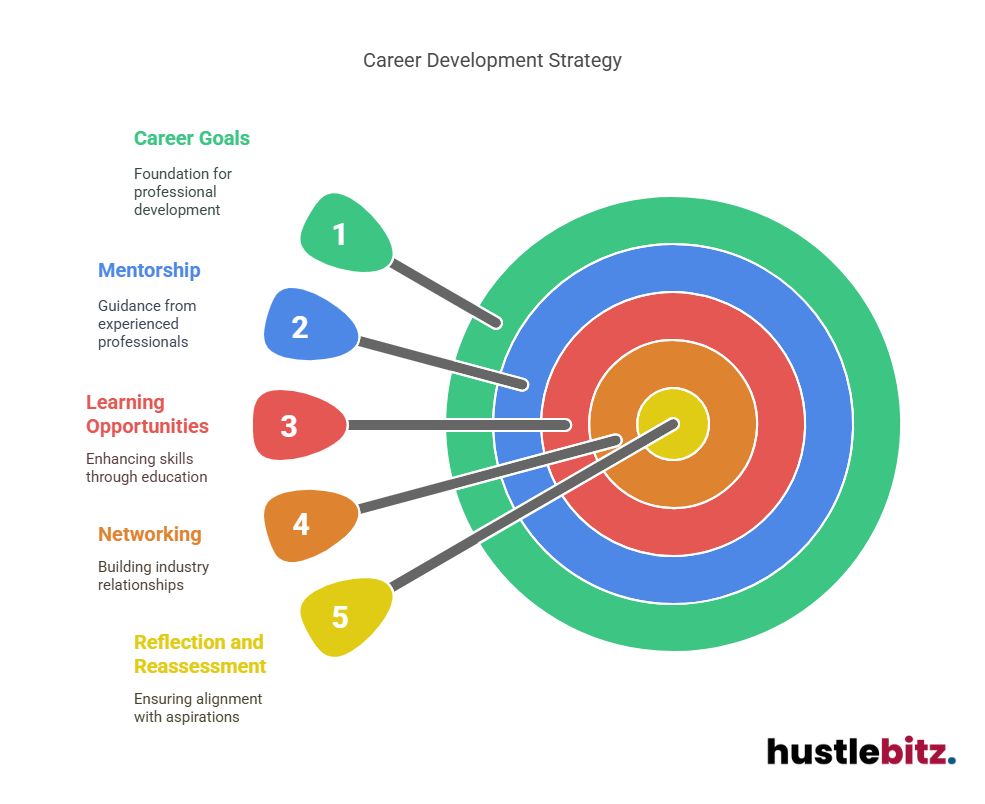To achieve professional growth, focus on several key strategies. First, seek mentorship from experienced professionals to gain insights and feedback. Pursuing advanced education enhances your qualifications and opens new opportunities. Attend industry conferences to expand your network and knowledge. Joining a professional association can provide resources and connections. Stretch assignments will challenge your skills and foster growth. Embrace self-reflection to assess your career objectives. Volunteer for leadership roles to develop crucial skills. Finally, stay informed about industry trends to maintain a competitive edge. By implementing these strategies, you can effectively navigate your career journey and uncover further valuable insights.
Key Takeaways
- Establish clear, achievable career goals to guide your professional development and focus your efforts effectively.
- Seek mentorship from experienced professionals who can provide guidance and valuable insights into your career path.
- Continuously pursue learning opportunities, such as courses and certifications, to enhance your skills and qualifications.
- Actively network within your industry to build relationships that can open doors to new opportunities and collaborations.
- Regularly reflect on your progress and reassess your goals to ensure alignment with your evolving career aspirations.

1. Seek Out Mentorship

One of the most effective strategies for career advancement is to actively seek out mentorship from experienced professionals in your field. The mentorship benefits are manifold, offering invaluable insights and guidance that can accelerate your professional growth. Finding mentors who align with your career goals is essential; consider their experience and mentorship styles to ensure a good fit.
Effective communication is a cornerstone of a successful mentor-mentee relationship. From the outset, it is crucial to set clear expectations regarding the objectives of the mentorship, the frequency of meetings, and the duration of the engagement. This clarity fosters a productive environment where both parties can thrive. Regular feedback sessions are vital, as they allow for open dialogue about progress, challenges, and areas needing improvement.
Networking through mentorship not only expands your professional connections but also enriches your understanding of the industry. This network can provide opportunities that might otherwise remain inaccessible. As you engage in this relationship, it is important to be proactive and take ownership of your development.
Measuring success in mentorship can be subjective, often encompassing personal growth, skill enhancement, and the achievement of specific career milestones. By keeping track of these outcomes and maintaining a reflective practice, you can ensure that the mentorship experience is mutually beneficial. Ultimately, seeking mentorship is an investment in your future, paving the way for sustained professional advancement and fulfillment.
2. Pursue Advanced Education

Pursuing advanced education can significantly enhance your qualifications and open doors to new career opportunities within your field. By investing in your professional development through advanced degrees, online courses, and skill certifications, you position yourself as a knowledgeable and competitive candidate in the job market.
Consider the following options for knowledge expansion and career advancement:
| Type of Education | Benefits |
| Advanced Degrees | In-depth knowledge and specialized expertise |
| Online Courses | Flexibility and accessibility for busy professionals |
| Skill Certifications | Validation of specific skill sets |
| Specialized Workshops | Hands-on experience and networking opportunities |
| Graduate Programs | Research opportunities and academic credentials |
These educational avenues not only promote lifelong learning but also enhance your professional network. Graduate programs and educational workshops provide a structured environment to deepen your expertise, while online courses and industry certifications offer convenience and relevance to current market trends.
Engaging in specialized workshops allows you to develop specific skills tailored to your career goals, thus making you a more attractive candidate to employers. Additionally, pursuing skill certifications can demonstrate your commitment to professional growth and competency in your field.
3. Attend Industry Conferences And Events

Attending industry conferences and events provides invaluable opportunities for networking, learning about emerging trends, and showcasing your expertise, complementing the knowledge gained through advanced education. These gatherings are pivotal for career advancement, offering a platform to connect with professionals who share your interests and aspirations. Engaging with keynote speakers and participating in panel discussions can deepen your understanding of industry trends and innovations.
Key benefits of attending these events include:
- Networking Opportunities: Building relationships with peers can lead to collaborations and job referrals, enhancing your professional network.
- Skill Enhancement: Participation in workshop sessions and breakout sessions allows you to develop new professional skills that can be applied in your current role.
- Industry Insights: Exhibitor showcases and discussions with industry leaders provide valuable insights into emerging trends, helping you stay ahead in your field.
Moreover, these conferences often feature diverse formats, such as panel discussions and interactive workshops, fostering an environment conducive to learning. This immersive experience enables you to gain knowledge directly from experts and apply it to your career path.
Establishing peer connections through these events can also create a support system for navigating challenges and opportunities in your profession. By actively participating in industry conferences, you not only enhance your knowledge but also position yourself as a proactive contributor to your field, paving the way for future career advancement.
4. Join A Professional Association

Joining a professional association offers a strategic advantage for career development, providing access to resources, networking opportunities, and industry-specific knowledge. These associations serve as vital hubs for professionals seeking to advance their careers and enhance their expertise. By becoming a member, individuals gain access to a wealth of industry resources, including research publications, training materials, and exclusive webinars.
One of the most significant benefits of joining a professional association is the plethora of networking opportunities it presents. Members can connect with industry leaders, peers, and potential collaborators through various networking events, fostering relationships that can lead to career advancement. Additionally, many associations offer certification programs that not only validate skills but also demonstrate commitment to professional development.
Engaging in leadership roles within the association can also be a powerful avenue for personal growth. Taking on responsibilities such as committee leadership or event organization allows members to refine their skills while contributing to the community. Moreover, knowledge sharing is a core tenet of these associations, where members can exchange insights, best practices, and innovative ideas.
Community involvement is another critical aspect of professional associations, often allowing members to participate in initiatives that promote the industry’s interests and address societal challenges. By joining a professional association, individuals can significantly enhance their skills and expand their knowledge base, positioning themselves for greater success in their careers.
5. Seek Out Stretch Assignments
Seeking out stretch assignments can significantly enhance professional growth by challenging individuals to step outside their comfort zones and develop new skills.
These assignments differ from regular tasks by pushing the boundaries of an individual’s capabilities, thereby providing unique stretch assignment benefits. Engaging in such initiatives encourages professionals to overcome stretch challenges and fosters a continuous learning environment.
To effectively identify stretch opportunities, consider the following:
- Expand your skill set: Embrace assignments that require skills you have not yet mastered to facilitate personal and professional development.
- Enhance team dynamics: Collaborate on stretch assignments, as working with diverse teams can lead to innovative solutions and improved interpersonal skills.
- Solicit feedback: Regularly seek constructive feedback on stretch performance to measure stretch success and identify areas for improvement.
Examples of stretch assignments include leading a cross-departmental project, mentoring a junior colleague, or spearheading a new initiative within your organization.
These experiences not only enhance skills gained from stretching but also contribute to overall career advancement.
To maximize the impact of stretch assignments, adhere to stretch assignment best practices, such as setting clear objectives, establishing a timeline for achievement, and reflecting on the outcomes.
6. Participate In Training And Development Programs

Engaging in training and development programs is crucial for professionals aiming to enhance their skills and stay competitive in an ever-evolving job market. These programs provide essential opportunities for skill enhancement, helping individuals stay abreast of industry trends and technological advancements. By participating in various training techniques, professionals can acquire new competencies that directly contribute to their career advancement.
Organizations often offer a range of development programs, including online courses, workplace workshops, and coaching sessions. These instructional resources are designed to cater to diverse learning styles and can significantly improve an employee’s effectiveness in their role. Online courses, for instance, allow for flexible learning, enabling professionals to balance their education with their work commitments.
Moreover, certification opportunities can further bolster an individual’s qualifications, making them more attractive to potential employers. Engaging in team training can also foster collaboration and synergy within the workplace, leading to improved team dynamics and productivity.
Ultimately, investing time in training and development programs is a proactive approach to employee development. It not only enhances personal skills but also contributes to the overall success of the organization. By taking advantage of these resources, professionals can position themselves as lifelong learners, ready to adapt to changes and seize new opportunities that arise in their careers.
7. Build Your Network

Building a robust professional network is essential for career advancement, as it opens doors to new opportunities and valuable insights within your industry.
Effective networking strategies focus on relationship building, which can lead to mentorship opportunities and career collaboration. By leveraging connections, professionals can tap into resources that may not be available through traditional job searches.
To optimize your networking efforts, consider the following strategies:
- Engage in Networking Events: Attend industry conferences, workshops, and seminars to meet potential collaborators and mentors. These events provide an excellent platform for professional introductions and relationship building.
- Utilize Online Networking: Leverage platforms like LinkedIn to connect with peers and industry leaders. Online networking allows for broader reach and can facilitate effective communication, even with individuals you may not meet in person.
- Practice Networking Etiquette: Always approach networking with a mindset of giving rather than taking. Be respectful and considerate in your interactions, as this fosters trust and encourages others to support you in return.
Incorporating these strategies into your professional routine can significantly enhance your career trajectory.
Remember, networking is not merely about collecting contacts; it’s about establishing genuine relationships that can lead to mutual growth and success.
8. Practice Self-Reflection

Practicing self-reflection is a critical component of professional development, as it enables individuals to assess their strengths, weaknesses, and career aspirations effectively.
By employing various self-awareness techniques, professionals can gain insights into their behaviors and motivations. This practice fosters personal growth by encouraging individuals to identify areas for improvement and set measurable goals.
One effective method of self-reflection is journaling. The journaling benefits include the ability to articulate thoughts and feelings, which can clarify career objectives and enhance emotional intelligence.
Regularly documenting experiences and emotions not only aids in stress reduction but also facilitates a deeper understanding of one’s responses to various situations.
Receiving feedback from colleagues is another essential aspect of self-reflection. Constructive feedback reception helps individuals recognize blind spots and adapt their goal-setting strategies accordingly.
By integrating this feedback into their self-reflective practices, professionals can enhance their time management and resilience-building capabilities.
Additionally, incorporating mindfulness practices into daily routines allows for greater self-awareness and emotional regulation. This promotes a balanced approach to work challenges, enabling individuals to navigate stress more effectively.
Ultimately, self-reflection is not a one-time event but a continuous journey that enriches both personal and professional lives. By committing to regular self-reflection, individuals can align their actions with their career aspirations, paving the way for sustainable growth and fulfillment.
9. Volunteer For Leadership Opportunities

Volunteering for leadership opportunities allows individuals to develop crucial skills while demonstrating initiative and commitment to their professional growth. Engaging in leadership roles, whether in a formal capacity or through project management, provides a platform to refine essential competencies.
By stepping forward, individuals can explore various leadership styles that resonate with their personal approach, enhancing their emotional intelligence and adaptability in diverse situations.
Participating in such roles also fosters an understanding of team dynamics, which is critical for effective decision making and conflict resolution. Leaders must cultivate strong communication skills to motivate their teams and navigate challenges.
By volunteering, individuals gain firsthand experience in:
- Strategic Planning: Crafting and implementing effective strategies to achieve team goals.
- Performance Feedback: Learning to give and receive constructive criticism to foster continuous improvement.
- Team Motivation: Inspiring others and maintaining high morale in pursuit of shared objectives.
These experiences not only bolster one’s resume but also equip individuals with the tools necessary to excel in future leadership positions.
As they tackle real-world challenges, they will enhance their project management capabilities, ultimately becoming more effective leaders.
In a competitive job market, those who actively seek out leadership opportunities distinguish themselves as proactive professionals committed to their career advancement.
10. Stay Up-To-Date With Industry News And Trends
Remaining informed about industry news and trends is essential for professionals seeking to maintain their competitive edge and make informed decisions in their careers. Staying updated allows individuals to anticipate changes, seize opportunities, and effectively navigate challenges in their respective fields.
To achieve this, professionals should engage with various resources. Subscribing to industry publications is a foundational step, as these sources provide in-depth articles and reports on relevant topics. Setting up news alerts can further ensure that you receive timely information about significant developments. Participating in online webinars can also enhance your knowledge while offering the chance to interact with industry leaders.
Additionally, expert podcasts are a convenient way to absorb information while multitasking. Social media platforms can be invaluable for following thought leaders and joining discussions, thereby fostering a deeper understanding of ongoing trends. Conducting trend analysis and market research allows professionals to assess the implications of these trends on their industries.
Engagement with case studies can provide practical insights into successful strategies and innovations. Professional blogs and industry forums are excellent venues for exchanging ideas and experiences with peers, which can lead to valuable networking opportunities.
Incorporating these practices into your routine not only enhances your expertise but also positions you as a knowledgeable resource within your organization. By consistently updating your understanding of industry news and trends, you can effectively contribute to your field and drive your career forward.
Final Thoughts
Achieving professional growth requires a multifaceted approach. By seeking mentorship, pursuing advanced education, and attending industry conferences, you can enhance your skills and expand your professional network. Engaging in stretch assignments and participating in training programs will push you beyond your comfort zone and keep you competitive. Joining a professional association and volunteering for leadership opportunities will further enrich your career development. Practicing self-reflection and staying updated with industry trends will ensure that you are aligned with your goals and prepared for future challenges. Implementing these strategies will not only drive your career forward but also help you navigate the dynamic landscape of your profession with confidence and clarity.




